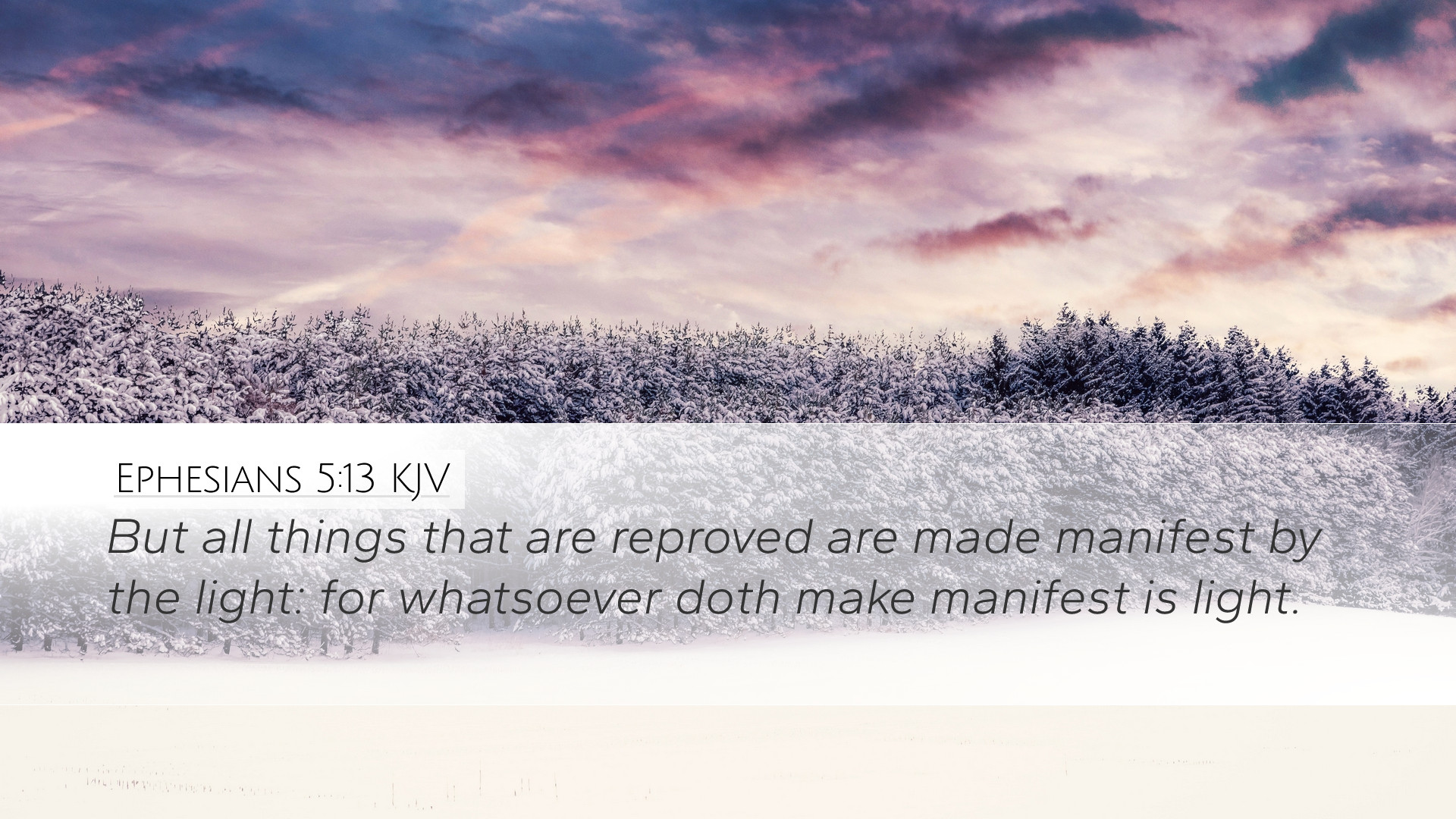Ephesians 5:13 - Commentary Summary
Verse Text: "But all things that are reproved are made manifest by the light: for whatsoever doth make manifest is light."
Understanding the Context
The Apostle Paul, in his letter to the Ephesians, richly develops Christian doctrine and ethical instructions for the life of believers. Ephesians chapter 5 addresses the transformation of Christians who are called to walk in love and righteousness. The specific verse 13 highlights the revealing power of light in contrast to the darkness of sin.
Key Insights from Commentaries
Matthew Henry's Commentary
Henry emphasizes the intrinsic power of light over darkness, illustrating that light has the ability to expose hidden sins and corrupt practices. He notes that this verse serves as a reminder that exposure is not merely punitive but is beneficial for growth.
- Light as a Revealer: According to Henry, the 'light' symbolizes the truth of God, which uncovers deceit and corruption. This light is essential for believers to avoid the shadows of sin.
- Manifestation and Accountability: By stating that "whatsoever doth make manifest is light," Henry underscores the accountability that comes with knowledge; as believers grow in understanding, they are accountable to live accordingly.
Albert Barnes' Notes on the Bible
Barnes articulates that the phrase "all things that are reproved" refers to those actions and behaviors that God condemns. The light, as he describes, does not only expose these actions but provides clarity on the nature of sin and righteousness.
- Moral Clarity: Barnes points out that the true understanding of moral issues comes from God’s illumination. The manifestation of light serves to demonstrate the nature of God’s righteousness contrasted with human depravity.
- Encouragement for Believers: The exposure of sin should provoke a response in believers to live more righteously, enabling them to shine the light of Christ in their communities.
Adam Clarke's Commentary
Clarke expands on the nature of the light that manifests certain things. He posits that the 'light' may refer not only to Christ but also to the Gospel itself, both of which reveal the true state of humanity and offer hope for redemption.
- Spiritual Illumination: Clarke asserts that spiritual illumination through faith enables the individual to discern right from wrong. This ability is a gift from God, allowing the follower of Christ to navigate through a morally complex world.
- Christian Conduct: He notes that the revealing nature of light serves as a call to action for Christians, challenging them to ensure their lives reflect the values of the Kingdom of God.
Applications for Pastors and Theologians
This verse and accompanying commentaries suggest several applications:
- Preaching the Word: Pastors are encouraged to preach with clarity and conviction, allowing the light of the Gospel to expose sin and illuminate paths of righteousness.
- Teaching Accountability: Teachers of the Word must instill a sense of accountability among believers, emphasizing how growth in knowledge and understanding leads to a greater responsibility in living a Christian life.
- Leading by Example: Church leaders should strive to reflect the light of Christ through their actions, being mindful that their lives serve as a testament to the transformative power of the Gospel.
Conclusion
Ephesians 5:13 serves as a profound reminder of the illuminating power of light as it pertains to the spiritual journey of believers. The insights from respected commentators emphasize the necessity of living in accordance with God's revelations. It challenges all believers to embrace the light, expose sin, and walk in righteousness, ultimately fulfilling their call as citizens of the Kingdom of God.


